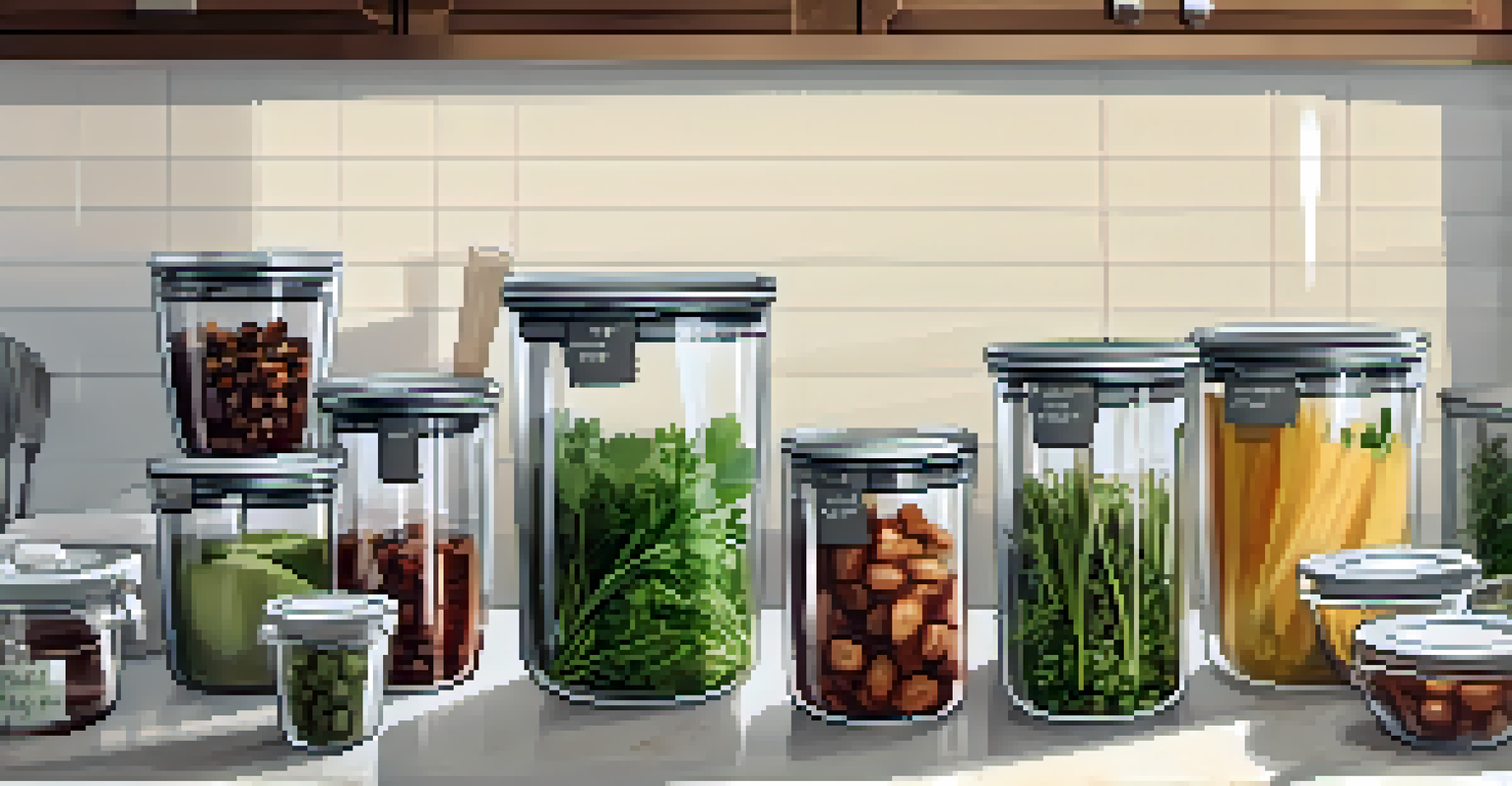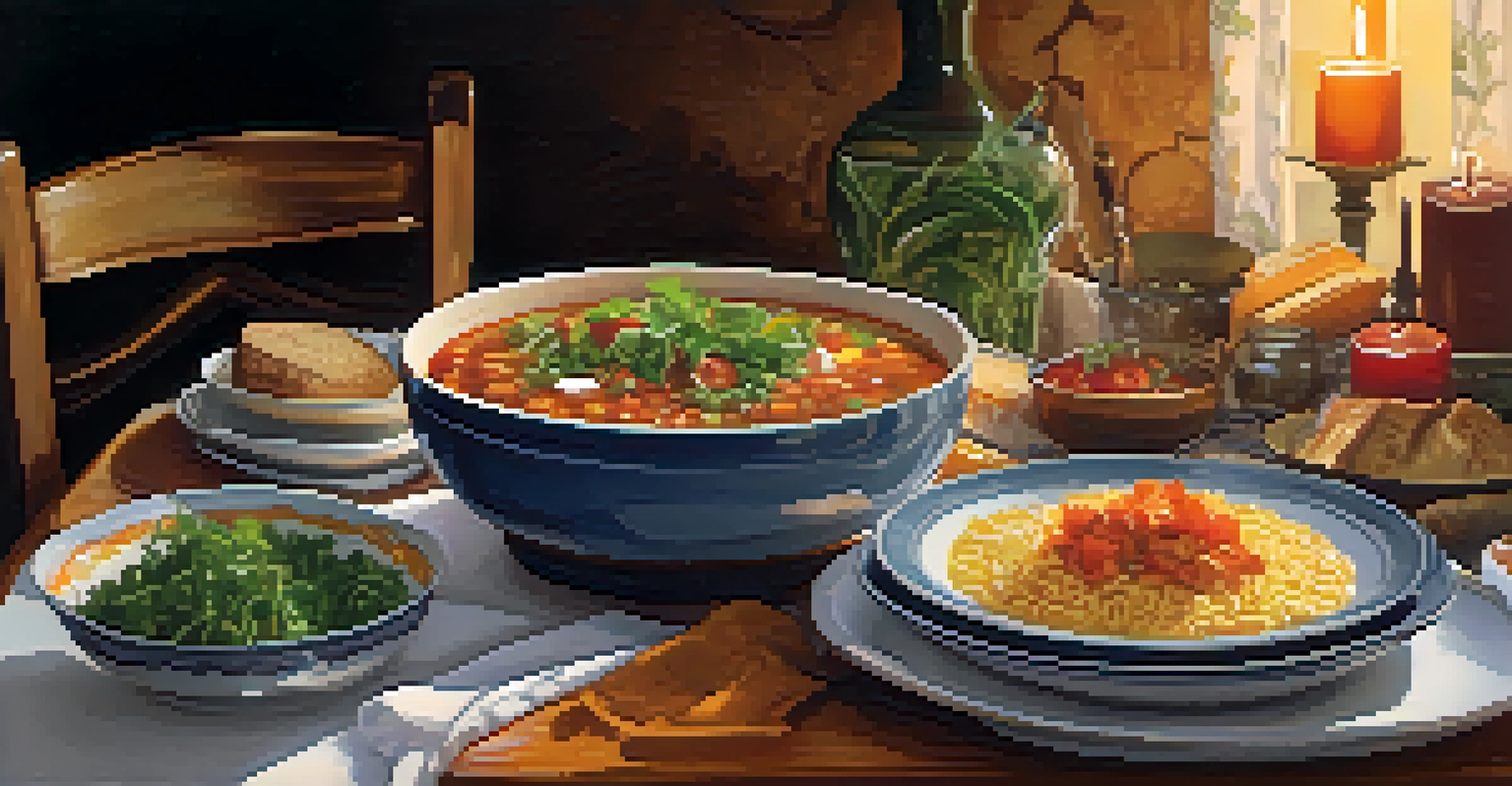How to Meal Prep for Healthy Eating on a Budget

Understanding the Basics of Meal Prep for Beginners
Meal prepping is about planning and preparing meals in advance. This can save you time, money, and stress throughout the week. By dedicating just a few hours on the weekend, you can ensure you have healthy options ready to go, reducing the temptation to grab unhealthy fast food.
Meal prep is a way to take control of your meals and your life.
It's not just about cooking; it's about strategizing your meals based on your dietary needs and budget. Start by brainstorming a few simple recipes that you enjoy and can make in bulk. This will make the process both enjoyable and cost-effective.
Lastly, don't forget to keep things flexible. Life can get busy, and your meal prep should accommodate that. If you find a recipe that you love, add it to your rotation, but also be open to trying new things as you go.
Planning Your Meals: Key to Successful Meal Prep
Effective meal prep starts with a solid plan. Take some time each week to map out your meals, considering what ingredients you already have at home. This not only helps to reduce waste but also ensures you’re using what you’ve purchased wisely.

When planning, think about balancing your meals with proteins, vegetables, and whole grains. For instance, if you plan to make a chicken stir-fry, you can prepare extra chicken and veggies to use in other recipes throughout the week.
Plan Meals for Success
Mapping out your meals each week helps reduce waste and ensures you're using ingredients wisely.
Creating a shopping list based on your meal plan can save you from impulse buys at the grocery store. Stick to your list as much as possible, and you'll find it easier to stay within your budget while still eating healthily.
Shopping Smart: How to Save Money on Groceries
To stick to your budget, consider shopping at local farmers' markets or discount grocery stores. These places often have fresh produce at lower prices than traditional supermarkets. Plus, buying in-season fruits and vegetables can help you save even more.
The secret of success is to be ready when your opportunity comes.
Buying in bulk can also lead to significant savings. Items like grains, beans, and nuts are often cheaper per ounce when purchased in larger quantities. Just be sure to store them correctly to avoid spoilage.
Don’t forget to look out for sales and coupons! Many stores have weekly ads or loyalty programs that can help you save money on items you frequently buy, making it easier to stick to your healthy eating goals.
Essential Kitchen Tools for Efficient Meal Prep
Having the right kitchen tools can make your meal prep experience smoother and more enjoyable. Invest in quality containers for storing your meals; glass containers are great for reheating and keeping food fresh. Consider getting a slow cooker or an Instant Pot to simplify cooking times.
A good knife set and cutting board are also essential for efficient chopping and prep work. These tools not only save time but also make the process feel less daunting, allowing you to enjoy cooking.
Smart Shopping Saves Money
Shopping at local markets and buying in bulk can significantly cut grocery costs while maintaining healthy eating.
Lastly, don’t underestimate the power of measuring cups and spoons. They can help ensure you’re portioning your meals correctly, which is especially important for maintaining a balanced diet and sticking to your budget.
Batch Cooking: Preparing Multiple Meals at Once
Batch cooking is a game-changer for meal prep. By making larger quantities of a single dish, you can save time and energy when preparing meals for the week. For example, making a big pot of chili can provide multiple servings to be enjoyed over several days.
Another great method is to cook proteins in bulk, like roasting several chicken breasts or baking a tray of fish. You can then pair them with different sides throughout the week to keep your meals varied and interesting.
To prevent boredom, try mixing up flavors and cuisines. If you batch cook a large quantity of rice, for instance, you can use it in a stir-fry one day and a burrito bowl the next. This keeps your meals fresh and exciting!
Storing Meals: Keeping Food Fresh and Delicious
Proper storage is crucial for maintaining the freshness of your prepped meals. Make sure your containers are airtight to prevent spoilage, and label them with the contents and date prepared. This way, you’ll know exactly what’s in your fridge and how long it’s been there.
Freezing meals can be a great way to extend their life. Dishes like soups, casseroles, and stews freeze well and can make for a quick meal option on busy days. Just remember to leave some space at the top of the container for expansion.
Batch Cooking for Efficiency
Preparing larger quantities of meals allows for time savings and varied meals throughout the week.
To make reheating easy, consider portioning meals into single servings. This not only simplifies your meal times but also helps with portion control. Plus, it makes grabbing a meal on the go a breeze!
Eating Healthy on a Budget: Making Smart Choices
Eating healthy doesn’t have to break the bank. Focus on whole foods like fruits, vegetables, grains, and legumes, which are often more affordable than processed items. These foods not only provide essential nutrients but also keep you feeling fuller longer.
Incorporating more plant-based meals into your week can also help reduce costs. Dishes centered around beans, lentils, and grains are typically less expensive than meat-based meals, and they can be just as delicious.

Lastly, don’t be afraid to get creative with leftovers. They can be transformed into new meals or snacks, minimizing waste and maximizing your budget. A little creativity can turn last night’s roasted veggies into a hearty soup or a vibrant salad!